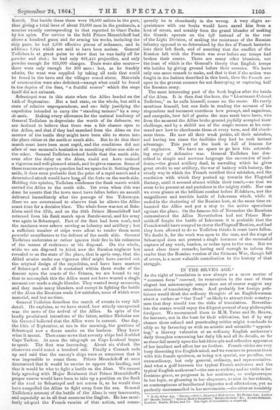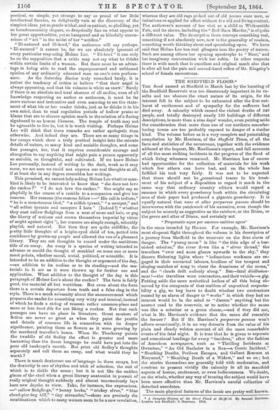IN THE SILVER AGE.* As the right of translation is
now always as a mere matter of " common form" reserved, its reservation in the ease of these elegant but miscroscopic essays does not of course suggest any intention of translating them. And probably few foreign pub- lishers would think the ordinary thoughts of an Englishwoman about a cuckoo or " Our Toad " so likely to attract their country- men that they should run the risks of translation. Neverthe- less the essays would repay the diligent perasal of any philosophic foreigner. We recommend them to M.M. Taine and St. Beare, for instance, not in the least for their edification, but if by any chance those refined and penetrating critics might vouchsafe to edify us by favouring us with an artistic and scientific " apprais- ing," a literary valuation of an ordinary English authoress's daily thoughts concerning her daily life and all its details, so far as these fall merely upon the kaleidoscopic and reflective apparatus of her intellect and affect her no further. French ethics are very busy dissecting the English mind, and we venture to present them with this female specimen, as being not special, nor peculiar, nor extraordinary, but only general, ordinary, and representative. And what a gulf between the typical French authoress and the typical English authoress I—the one so striking and so virile in her feminine grace, so poignant in her sentiment, so sculpturesque in her logic, so gleaming in her eloquence, so nice in her ridicule, so contemptuous of intellectual fripperies and affectations, yet so perfectly untrammelled in her movements,—the other so homishly
• In the Silver Age. "Essays,—Mat i5, Dispersed Meditations. By Boime Lee, Author of " Maude Talbot."" flylv.ut Holes Daughter," Kathie Brenda," at In two goltunes. London: Smith, Elder, and Ca The right of translation Is reserved.
poetical, so simple, yet strange to say so proud of her little intellectual fineries, so delightedly vain at the discovery of the simplest ideas, yet so gentle withal, and so patient, so plodding, yet so humdrummishly elegant, so dropsically fine on what appear to her great opportunities, yet so hampered and so blissfully uncon- scious of " art " in the midst of her " artifice."
"Ill-natured and ill-bred," the authoress will say perhaps. " Ill-natured" it cannot be, for we are absolutely ignorant of every particular respecting Holme Lee. " 111-bred " it can only be on the supposition that a critic may not say what he thinks 'within certain limits of a woman. But there must be an advan- tage in being able to read the unprepossessed and unbiassed opinion of any ordinarily educated man on one's own perform- ance. As the Saturday Review truly remarked lately, it is rather the tendency of critics to believe " that their angel is always appearing, and that his raiment is white as snow." Surely if there is an absolute and total absence of all malice, even of all knowledge respecting an author or authoress, it must be far more curious and instructive and even amusing to see the state- ment of what his or her reader thinks, juit as he thinks it in his own mind, than to read regulation periods of hollow praise or blame that are to sincere opinion much in the relation of a flaring signboard to an honest likeness. The temple of truth may not be agreeable to live in, but it is worth visiting. Perhaps Holme Lee will think that these remarks are rather apologetic than otherwise. And indeed they are. There are so many things in her essays which show a truly poetical insight into the minute details of nature, so many kind and amiable thoughts, and some fine passages, too, that it requires considerable courage and abnegation to say anything that might pain a person apparently so amiable, so thoughtful, and cultivated. If we knew Holme Lee personally, instead of writing in the dark, weak as it may seem, we are sure we could not express our real thoughts at all, if at least she in any degree resembles her writings.
This premised, we cannot help asking Holme Lee whether man- kind is likely to be interested to know that " she does not love the cuckoo ?" " I do not love the cuckoo." She might say so playfully in the course of a ramble to a companion and give her reasons. Her reasons (the reasons follow :—" His call is tedious," "he is a monotonous bird," "a selfish tyrant," "a usurper," and "all selfish tyrants and usurpers I hate " [Indeed 1] " whether they oust callow fledglings from a nest of moss and hair, or gag the liberty of nations and crown themselves imperial by virtue of might against right ''), her reasons are simple enough, tolerably playful, and natural. But then they are quite childlike, the pretty little thoughts of a bright-eyed child of ten, petted into confidence by grown-up people and allowed the run of a pleasant library. They are not thoughts to record under the ambitious title of an essay. An essay is a species of writing intended to advance or mould the thought of mankind on some one or more moot points, whether moral, social, political, or scientific. It is intended to be an addition to the thought or argument of the day, —an addition to its outline or to its shading—and the ma- terials in it are as it were thrown up for further use and application. What addition to the thought of the day is this paragraph of Holme Lee's about the cuckoo ? The form is fairly good, the material all but worthless. But even about the fore► there is a certain departure from truth and a false ring in the style. There is a mock solemnity about the announcement which prepares the reader for something very witty and ironical, instead of which he finds a string of reasons rather common-place and more or less bond fide for not liking a cuckoo. Not that such passages can have no place in literature. Great masters of fiction are never so great as when they paint the prattle and details of common life in connection with its deeper significance, painting them as flowers as it were growing by the murdered traveller's bones. When Mr. Thackeray paints the twaddle of old Sedley the effect is greater and more harrowing than the finest language he could have put into the poor old bankrupt's mouth. But print old Sedley's thoughts separately and call them an essay, and what would they be worth ?
There is much dexterous use of language in these essays, but the dexterityls one of rhythm and trick of selection, the end of which is to tickle the sense ; but it is not like the sudden gleam of the steel when a great literary anatomist in pursuit of really original thought suddenly and almost unconsciously lays bare new depths to view. Take, for instance, the expressions, —" callow fledglings," " bonny becks," " tricksy elves," "blue cloud-pier.ing hill," " tiny streamlet,"—these are precisely the combinations which to many women seem to be anew revelation, whereas they are old rags picked out of old poems once new, or imitations re-applied for effect without the old and living context. The authoress's account of her visit as a child to Whitsuntide Fair, and its shows, including the " Red-Barn Murder," is of quite a different value. The description there conveys something real, something if not absolutely new, new to the generality of readers, something worth thinking about and speculating upon. We have said that Holme Lee has real glimpses into the poetry of nature. Such are among others her opening apostrophe to " Sleet," and her imaginary conversation with her robin. In other respects there is with much that is excellent and original much also that is after all but the pale and second-hand reflex of Mr. Kingsley's school of female earnestness.































 Previous page
Previous page